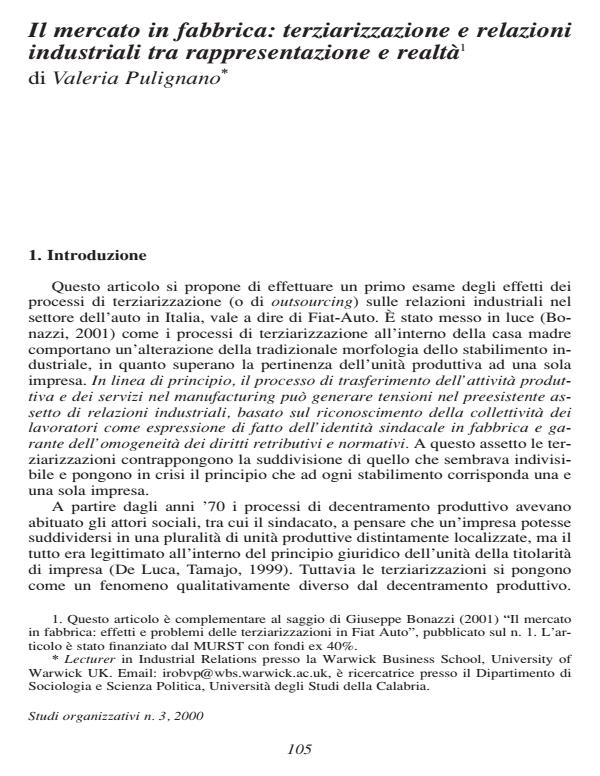Il mercato in fabbrica: terziarizzazione e relazioni industriali tra rappresentazione e realtà
Titolo Rivista STUDI ORGANIZZATIVI
Autori/Curatori Valeria Pulignano
Anno di pubblicazione 1 Fascicolo 2000/3
Lingua Italiano Numero pagine 25 P. Dimensione file 110 KB
DOI
Il DOI è il codice a barre della proprietà intellettuale: per saperne di più
clicca qui
Qui sotto puoi vedere in anteprima la prima pagina di questo articolo.
Se questo articolo ti interessa, lo puoi acquistare (e scaricare in formato pdf) seguendo le facili indicazioni per acquistare il download credit. Acquista Download Credits per scaricare questo Articolo in formato PDF

FrancoAngeli è membro della Publishers International Linking Association, Inc (PILA), associazione indipendente e non profit per facilitare (attraverso i servizi tecnologici implementati da CrossRef.org) l’accesso degli studiosi ai contenuti digitali nelle pubblicazioni professionali e scientifiche.
During the 1990s outsourcing became an increasingly popular managerial strategy in both private and public sectors. Although the term is not always used with the same meaning, the basic definition of outsourcing for our purpose is a process whereby an organisation ceases to carry out internally various functions outside its ‘core’ activity and instead purchases the service or products concerned from outside parties operating under the same factory’s roof. The author, drawing on field research and secondary sources, argues that the analysis of outsourcing in Italy provides a critical re-examination of the ‘adversial’ union approach, typical of the other international experiences. In fact, the analysis demonstrates that Italian trade unions did not oppose the recent workplace restructuring practices. Nevertheless, she claims, outsourcing strongly affects collective bargaining arrangements and unions representatives by potentially leading to individuate an ambivalent framework for Italian workplace industrial relations. Whereas it provides to fragment the contractual working conditions of employees, outsourcing potentially weakens the capacity of organisation, representation and intervention of trade unions. The result has been, on one side the re-unification of the working conditions within the outsourced enterprises under the same sectoral collective agreement (metalworking sector) and, on the other side the reinforcement of the structures of horizontal representation by strengthening co-operation among trade union representatives of the main companies, outsourcer and subcontractor firms. By considering these results the paper will examine the Italian unions’ response to outsourcing in breadth. Finally, the attempt to evaluate trade unions opportunities to establish a social model on an international basis will be assessed through the examination of the challenges and opportunities different patterns of post-fordism have led to Italian unionism in the last twenty years.
Valeria Pulignano, Il mercato in fabbrica: terziarizzazione e relazioni industriali tra rappresentazione e realtà in "STUDI ORGANIZZATIVI " 3/2000, pp , DOI: